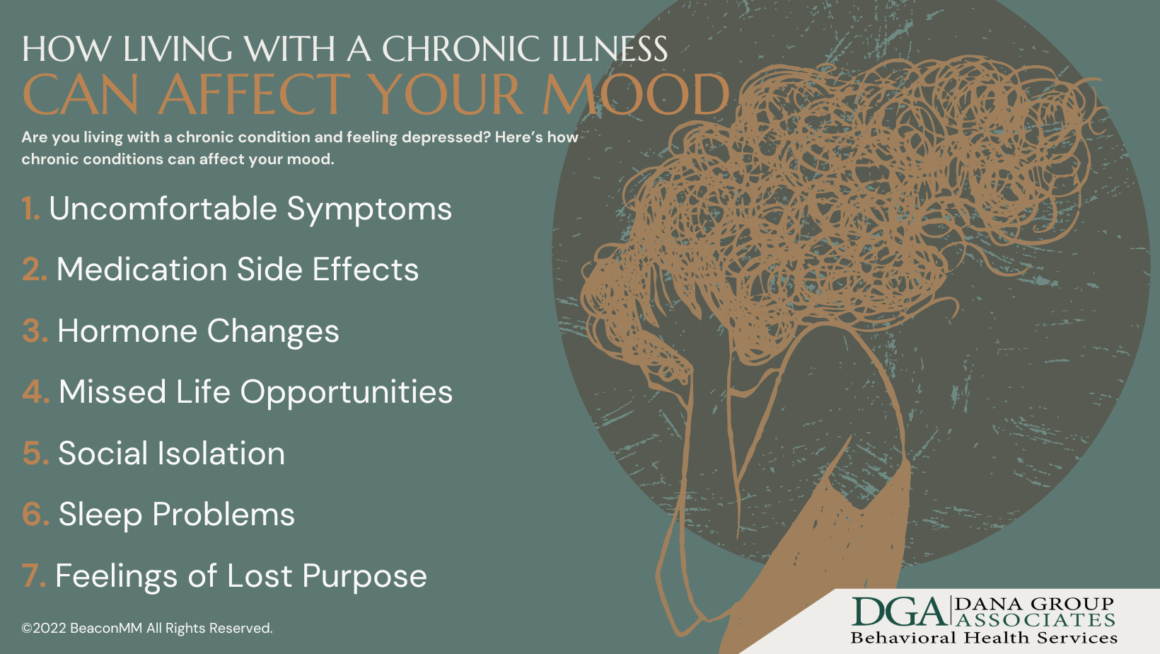Living with chronic illness can make every day challenging. From the illness itself to all the things it forces or prevents you from doing, chronic illness can affect your mood significantly. Here’s how ongoing illnesses can affect your mood and what you can do to build a better life despite your illness.
Is your chronic condition making you feel depressed? We encourage you to schedule an appointment to discuss your needs with a Dana Behavioral Health counselor.
How Chronic Conditions Affect Your Mood

Chronic conditions can change your mood dramatically. Because these illnesses can impact every aspect of your life, it’s important to take a look at what’s happening to you. Then, you can create a plan to improve your mood.
Symptoms of Your Chronic Illness
Let’s start with the symptoms of the chronic illness that you deal with constantly. These symptoms may cause ongoing pain that you can’t escape. Maybe you constantly need to be mindful of your symptoms to prevent a flare-up. Perhaps your illness comes with fatigue, dizziness, or mobility issues. Sometimes, doctors can help relieve your symptoms. Other times, these symptoms continue to make your life harder and more unpleasant.
Medications and Hormones
Most people with chronic conditions have to take medications, either to reverse or to slow the progression of their illness or to ease the symptoms. These medications might have side effects that bring more pain. They might give you brain fog or muscle tension.
Side effects can be annoying and distressing, especially if there is no other medication that will do the job without side effects. In addition, having a chronic illness can cause changes in your hormones. Because hormones play a large part in determining your mood, you could become depressed.
Missed Opportunities
Many chronic illnesses keep you from doing the things you would like to do. You may wish to go out for an evening, try a new job, or take up a new hobby. Or maybe you would like to spend some time with visiting friends. If your illness prevents you from doing those things you love, depression may follow very soon.
Isolation
Chronic illnesses and depression have something in common. Both can lead to isolation. When your chronic illness is at its worst, you might not have the energy, comfort, or stamina to put yourself in a social situation. At the same time, many people who have depression isolate themselves, perhaps to avoid emotional pain or to hide their depression from others. When you have a chronic illness and depression, this isolation can become a downward spiral into severe depression.
Sleep Problems
Chronic illnesses often cause problems with sleeping. From migraines to muscle aches, pain can keep you awake most of the night. Some medications can make you sleepy all the time or cause insomnia. The thing to remember is that just as chronic illnesses can thwart your sleep, sleep problems can lead to depression. Once you’re depressed, you may sleep too much or too little, and the cycle continues.
Lost Sense of Meaning and Purpose
Sometimes, chronic conditions prevent you from participating in work, college, volunteering, or other activities that give you a sense of meaning and purpose. And sometimes, this lost sense of purpose brings an existential crisis. You might ask, “Why am I alive if I can’t follow my dreams or fulfill my personal goals?” This is often the same question asked by people who have depression.
Feeling depressed about your chronic illness and its challenges? We invite you to take action today by setting an appointment at Dana Behavioral Health.
Symptoms of Depression
Depression symptoms can happen when your chronic illness is making your life more difficult. While not everyone who has a chronic illness has depression, it helps to know the symptoms of depression. Then, you can recognize signs of trouble and seek help if needed. Here’s a list of depression symptoms you might notice.
- Losing interest in things you once enjoyed
- Depressed mood
- Feeling guilty, helpless, or worthless
- Pessimistic or hopeless
- Sleeping or eating too much or too little
- Changes in appetite
- Restlessness
- Irritability
- Feeling sad or empty
- Unexplained pain or digestive problems
- Having suicidal thoughts or attempts
Certainly, living with a chronic condition is extremely difficult by itself. Then, when you also have depression, it can keep you from taking good care of yourself. As you neglect your physical health issues, you become even more prone to depression symptoms.
How to Improve Your Quality of Life
If you are dealing with a chronic illness and feel more depressed every day, there is still hope and help for you. You do face a particularly difficult challenge. That’s why it’s critical that you address your depression as soon as possible. Here are several ways to start.
Educate Yourself
The more you know about depression, the easier it is to recognize its symptoms. By educating yourself about both your chronic illness and depression, you set yourself up to handle it all more effectively. You can read blogs and listen to podcasts from mental health professionals. Or you can simply seek therapy that includes psychoeducation.
Try Therapy
When you are experiencing depression, a counselor can give you personalized treatment to help you in your unique situation. Therapists can offer you many tools, suggestions, and insights that promote positive feelings and behaviors.
The way you learn to manage your moods may be completely different than someone else learns it. Your therapist recognizes your individuality and uses therapeutic techniques and methods that are tailored to your needs.
Attend Support Groups
Support groups create a special kind of atmosphere for people who have chronic illnesses and depression. You may find that you benefit most from a support group for your chronic condition. After all, the people there understand the health problem you’re going through. At the same time, they may have experience with how that condition can lead to depression. Support groups nearly always include educational resources and meetings where you can find out more about how to improve your life.
Learn How to Cope
Coping skills can help you get through your day with a chronic illness. What’s more, learning to cope with depression can make a vast improvement in your life. Here are some coping skills you can learn and use for your chronic illness and depression.
- Learn and use the Benefits of Mindfulness for Your Mental Health
- Practice meditation
- Read for enjoyment or learning
- Look for humorous moments
- Try a new hobby or take up an old one again
- Visit with your friends
- Write down your feelings
- Play or listen to music
- Write a story or poem
- Get outside when you can
- Practice good self-care and grooming
- Create art
Dana Group for Chronic Illness and Depression
You will find that there are many resources for people with chronic illness and depression. At Dana Behavioral Health Behavioral Health Services, we believe that mental health help should be accessible to everyone.
Our team of mental health professionals offers expert help for those who struggle with depression and other behavioral conditions. We provide evidence-based treatments and compassionate care to assist you in improving your quality of life. If you have a physical illness, with its special challenges, along with depression, we give you the education, support, insight, and empathy you need to live the good life that you deserve.
Could you use some support and insight into dealing with chronic illness and depression? We encourage you to reach out for an appointment with Dana Behavioral Health.
